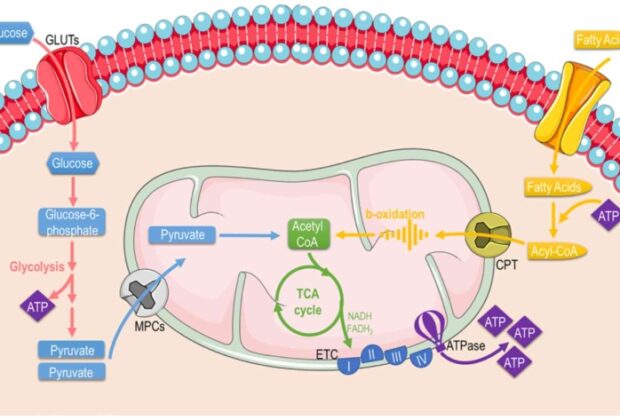For the sake of our health, a balanced lipid homeostasis must be maintained. Fat is an essential part of our diet, even though eating too many fatty foods raises the risk of metabolic diseases like obesity and atherosclerosis. The body gets its fundamental building blocks from digested lipids, which also help vital vitamins be absorbed more easily. A group of scientists led by Professor Manolis Pasparakis and including Professors Aleksandra Trifunovic and Christian Frezza from the University of Cologne’s Excellence Cluster CECAD and Jörg Heeren from the University of Hamburg have reported on a novel mechanism that controls how the intestine processes and transports dietary lipids. Their work was published in the journal Nature.
The study focused on the role of enterocytes, which are intestinal lining cells with a specialized role in the absorption and transport of nutrients from digested food, and mitochondria, which are organelles that function as the powerhouses of the cell. The abnormal accumulation of dietary fat in enterocytes and the impaired delivery of lipids to the peripheral organs were found to be caused by the disruption of mitochondrial function in the mouse intestine.
One of the study’s most important conclusions was that enterocytes with dysfunctional mitochondria displayed poor chylomicron packaging and transport. The correct formation and movement of chylomicrons, which are important carriers of dietary fats, are necessary for the absorption of nutrients.
“This discovery marks a significant leap forward in understanding the crucial role of mitochondria in dietary lipid transport and metabolism,” stated Dr. Chrysanthi Moschandrea, the study’s principal investigator. This finding has implications that go beyond the purview of basic science. Professor Aleksandra Trifunovic continued, “These findings provide new perspectives for the better understanding of the gastrointestinal symptoms in patients suffering from mitochondrial disease, and may also lead to new therapeutic approaches,”
For the sake of our health, a balanced lipid homeostasis must be maintained. Fat is an essential part of our diet, even though eating too many fatty foods raises the risk of metabolic diseases like obesity and atherosclerosis. The body gets its fundamental building blocks from digested lipids, which also help vital vitamins be absorbed more easily. A group of scientists led by Professor Manolis Pasparakis and including Professors Aleksandra Trifunovic and Christian Frezza from the University of Cologne’s Excellence Cluster CECAD and Jörg Heeren from the University of Hamburg have reported on a novel mechanism that controls how the intestine processes and transports dietary lipids. Their work was published in the journal Nature.
The study focused on the role of enterocytes, which are intestinal lining cells with a specialized role in the absorption and transport of nutrients from digested food, and mitochondria, which are organelles that function as the powerhouses of the cell. The abnormal accumulation of dietary fat in enterocytes and the impaired delivery of lipids to the peripheral organs were found to be caused by the disruption of mitochondrial function in the mouse intestine.
A significant discovery of the research was that enterocytes exhibited compromised chylomicron packaging and transport when mitochondria were not functioning correctly. Nutritional absorption depends on the proper formation and transport of chylomicrons, which are important carriers of dietary fats.
“This discovery marks a significant leap forward in understanding the crucial role of mitochondria in dietary lipid transport and metabolism,” stated Dr. Chrysanthi Moschandrea, the study’s principal investigator. This finding has implications that go beyond the purview of basic science. Professor Aleksandra Trifunovic continued, “These findings provide new perspectives for the better understanding of the gastrointestinal symptoms in patients suffering from mitochondrial disease, and may also lead to new therapeutic approaches,”








